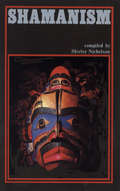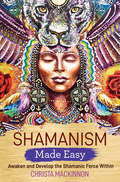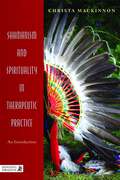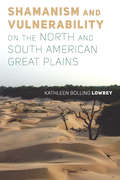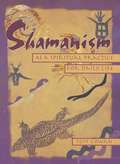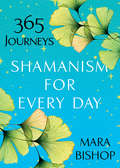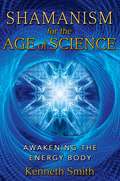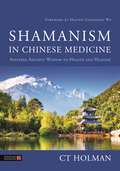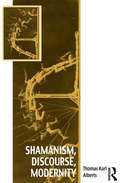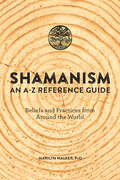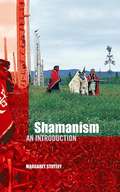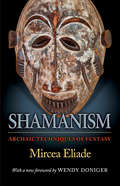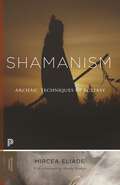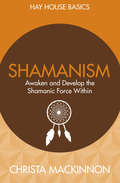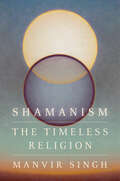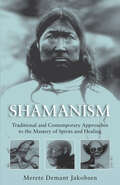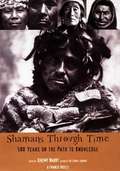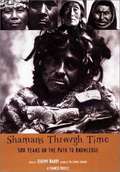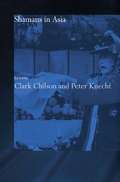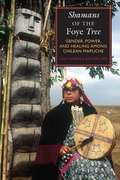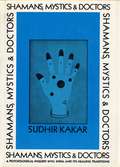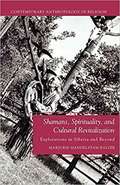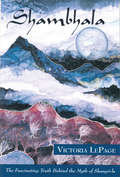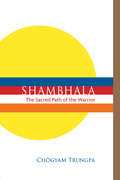- Table View
- List View
Shamanism
by Shirley NicholsonA powerful collection of essays from authors such as Mircea Eliade, Joan Halifax, Stanley Krippner, Brooke Medicine Eagle, Serge King, and Michael Harner on the mystifying phenomenon of shamanism around the world---what it is, how it works and why.
Shamanism Made Easy: Awaken and Develop the Shamanic Force Within
by Christa MackinnonReconnect with your authentic self and bring meaning back into your life with the ancient, time-tested wisdom of shamanism.This book is a fantastic and comprehensive introduction to shamanism by a leading expert and teacher on the subject. Shamanism is the oldest and most enduring spiritual wisdom tradition on Earth. It offers powerful practices for healing and finding wholeness, and is appealing to a whole new generation of spiritual seekers. Shamanism Made Easy, written by a much loved university psychotherapist and shamanic teacher, explains the subject in a clear and easily digestible format, and shows why these deeply transformative techniques are so needed in our challenging times. In this book, the reader will learn, amongst many things, how to build an altar and create a sacred space, conduct ceremonies and design a daily ritual, connect with spirit helpers, ancestors and descendants, and use dance as a tool for awakening and freedom. Above all, readers will learn what it is like to undergo transformative journeys for personal healing and development. This book was previously published within the Hay House Basics series.
Shamanism and Spirituality in Therapeutic Practice: An Introduction
by Christa MackinnonIncreasing numbers of professionals in the fields of psychology and therapy are seeking to incorporate elements of spirituality into their therapeutic oeuvre, addressing not only mental and emotional issues, but also the soul. This book discloses how indigenous traditions can be adapted to offer practitioners a highly effective repertoire of insights, psycho-spiritual approaches and therapeutic tools. The underlying concepts and world-views of indigenous and contemporary shamanism are explained and tied in with current developments in psychology and science. After clarifying altered states of perception, concepts of integrative wholeness of mind, body, soul and spirit and transformative shamanic 'healing' approaches, the book goes on to outline concrete contemporary tools and techniques that can be applied directly to work with clients. It presents research, examples and case studies throughout. This will be enlightening and compelling reading for psychologists, therapists, counsellors and coaches looking for profound insights and innovative methods of practice that cater for the whole human psyche, reaching beyond contemporary Western mind and body approaches.
Shamanism and Vulnerability on the North and South American Great Plains
by Kathleen Bolling LowreyIn Shamanism and Vulnerability on the North and South American Great Plains Kathleen Bolling Lowrey provides an innovative and expansive study of indigenous shamanism and the ways in which it has been misinterpreted and dismissed by white settlers, NGO workers, policymakers, government administrators, and historians and anthropologists. Employing a wide range of theory on masculinity, disability, dependence, domesticity, and popular children’s literature, Lowrey examines the parallels between the cultures and societies of the South American Gran Chaco and those of the North American Great Plains and outlines the kinds of relations that invite suspicion and scrutiny in divergent contexts in the Americas: power and autonomy in the case of Amerindian societies and weakness and dependence in the case of settler societies. She also demonstrates that, where stigmatized or repressed in practice, dependence and power manifest and intersect in unexpected ways in storytelling, fantasy, and myth. The book reveals the various ways in which anthropologists, historians, folklorists, and other writers have often misrepresented indigenous shamanism and revitalization movements by unconsciously projecting ideologies and assumptions derived from modern ‘contract societies’ onto ethnographic and historical realities. Lowrey also provides alternative ways of understanding indigenous American communities and their long histories of interethnic relations with expanding colonial and national states in the Americas. A creative historical and ethnographical reevaluation of the last few decades of scholarship on shamanism, disability, and dependence, Shamanism and Vulnerability on the North and South American Great Plains will be of interest to scholars of North and South American anthropology, indigenous history, American studies, and feminism.
Shamanism as a Spiritual Practice for Daily Life
by Tom CowanThis inspirational book blends elements of shamanism with inherited traditions and contemporary religious commitments. Drawing on shamanic practices from the world over, SHAMANISM AS A SPIRITUAL PRACTICE FOR DAILY LIFE addresses the needs of contemporary people who yearn to deepen their own innate mystical sensibilities. This inspirational book shows how to develop a personal spiritual practice by blending elements of shamanism with inherited traditions and current religious commitments. Contents include:The central role of power animals and spirit teachers. Visionary techniques for exploring the extraordinary in everyday life. Elements of childhood spirituality including songs, secret hiding places, power spots, and imaginary power figures. A journey to an ancestral shaman to recover lost knowledge.
Shamanism for Every Day: 365 Journeys
by Mara BishopDISCOVER YOUR UNIQUE PATH For thousands of years, practitioners of shamanism have found healing and wisdom by connecting to their own spirits and the spirit that lives in all things. Shamanism can be practiced by anyone. Wherever we are, the powers wihtin the web of life and the keys to our personal evolution are available. In these pages, longtime shamanic practitioner and intuitive consultant Mara Bishop introduces the simple yet profound method of shamanic journeying. On this path you will: · Connect to your innate knowing, for calm and confidence in intense times. · Develop meaningful relationships with nature for healing and guidance. · Explore spiritual realms with the aid of compassionate spirits. · Learn to manifest your goals and visions through ceremony. With 365 unique journey topics that can be used in any order, or as meditations, SHAMANISM FOR EVERY DAY offers an invaluable guide to anyone searching for a daily connection to the sacred.
Shamanism for the Age of Science: Awakening the Energy Body
by Kenneth SmithA practical guide to understanding and awakening the human energy body • Shows how the energy body forms our reality from the infinite possibilities presented by our thoughts, feelings, and those around us • Illustrates the anatomy of the energy body, including its connections to the nervous system, chakras, and meridians • Provides step-by-step exercises to awaken the energy body, expand awareness, and begin consciously creating your own reality At a time when consciousness and other aspects of our energetic anatomy are finding their way into modern science, Kenneth Smith blends traditional shamanism with cutting-edge research in bioenergetics and neuroscience to offer this user’s guide to the energy body--explaining what it is, what its capabilities are, and how to harness it as a vehicle for higher consciousness and heightened awareness. For more than 5,000 years, shamans of the Toltec tradition have worked with the energy body, learning its structure and perceptual capacities as well as mapping it as an objective, measurable part of our anatomy. Drawing from his decades-long involvement in this tradition and his work in the field of bioenergetics, Smith explains how the energy body shapes our perceptions, determines our state of consciousness, and forms our reality from the infinite possibilities presented by our thoughts, feelings, and those around us. Illustrating our energetic anatomy and its connections to the nervous system, chakras, and meridians, he provides step-by-step exercises to awaken the energy body, expand awareness, and begin consciously creating your own reality.
Shamanism in Chinese Medicine: Applying Ancient Wisdom to Health and Healing
by CT HolmanThis engaging, highly anticipated book compellingly describes healing techniques of Chinese shamanism while respecting the tradition.CT Holman, a medically trained and licensed clinician of over 20 years, clearly explains how Chinese shamanism can be seamlessly woven into modern lifestyle and contemporary medical practices. He explores effective methods to address physical pathologies and emotional imbalances by applying shamanic-influenced techniques including visualizations, verbal healing and shamanic drumming, among others for self-care and medical treatment. The primary resource for the material presented originates from the author's intensive decade-long study under shamanic teacher, Master Zhongxian Wu.Several color illustrations and before-and-after patient photos are included that beautifully depict the spirit-based diagnostics and treatments. Incorporating numerous clinical examples and thoroughly researched procedures, this book teaches practitioners how to combine treatments - concentrating on the spirit and soul - with modern medicine to treat the whole person and enrich their practice. This enlightening book is a must-read for Chinese medicine practitioners, other medical professionals and non-professionals interested in the subject.
Shamanism, Discourse, Modernity (Vitality of Indigenous Religions)
by Thomas Karl AlbertsShamanism, Discourse, Modernity considers indigenous peoples’ struggles for human rights, anxieties about anthropocentric mastery of nature, neoliberal statecraft, and entrepreneurialism of the self. The book focuses on four domains - shamanism, indigenism, environmentalism and neoliberalism - in terms of interrelated historical processes and overlapping discourses. In doing so, it engages with shamanism’s manifold meanings in a world increasingly sensitive to indigenous peoples’ practices of territoriality, increasingly concerned about humans’ integral relationship with natural environments, and increasingly encouraged and coerced to adjust self-conduct to comport with and augment government conduct.
Shamanism: An A-Z Reference Guide
by Marilyn Walker PhDDiscover the history and core elements of Shamanism Shamanism is a widely used term for a broad range of spiritual practices across time, continents, and cultures. Shamanism is your all-in-one reference guide to shamanic traditions and healing modalities around the world. Entertaining and easy to navigate, Shamanism is a rich collection of unique facts and stories from shamanic cultures. You'll find engaging entries on cultural beliefs, spiritual motifs, sacred objects, and rituals, like Vibrational Medicine and Soul Retrieval (recovering lost souls or soul parts). Shamanism includes: Shamanic handbook—Explore the history and mythology of Shamanic cultures, as well as engaging info on spiritual ecology or the back-to-nature movement. All about rituals—Learn about numerous rituals and techniques, like healing with crystals and extracting malevolent spirits with a Soul Catcher. Animism to Zoroastrian—This guide is organized alphabetically for easy reference so you can build your knowledge on the go. Discover the magic, mythology, and healing history of Shamanism with this introductory guide.
Shamanism: An Introduction
by Margaret StutleyShamanism is one of the earliest and farthest-reaching magical and religious traditions, vestiges of which still underlie the major religious faiths of the modern world. The function of the shaman is to show his or her people the unseen powers behind the mere appearances of nature, as experienced through intuition, in trance states, or during ecstatic mystical visions. Shamans possess healing powers, communicate with the dead and the world beyond, and influence the weather and movements of hunting animals. The psychological exaltation of shamanism trance states is similar to the ecstasies of Yogis, Christian mystics and dervishes. Shamanism: An Introduction traces the development of shamanism in its many fascinating global manifestations. Looking at shamanic practices from Siberia to China and beyond, it provides an accessible guide to one of the world's most ancient, notorious and frequently misrepresented spiritual traditions. Placing special emphasis on the climate, geographic and cultural pressures under which shanic customs arose and continue to be observed, Margaret Stutley summarizes and clearly explains the logic of a faith whose fantastical elements hold a special place in popular imagination.
Shamanism: Archaic Techniques of Ecstasy
by Mircea Eliade Willard R. TraskThis book covers the entire phenomenon of shamanism and at the same time situates it in the general history of religions.
Shamanism: Archaic Techniques of Ecstasy
by Mircea EliadeThe foundational work on shamanism now available as a Princeton Classics paperbackShamanism is an essential work on the study of this mysterious and fascinating phenomenon. The founder of the modern study of the history of religion, Mircea Eliade surveys the tradition through two and a half millennia of human history, moving from the shamanic traditions of Siberia and Central Asia—where shamanism was first observed—to North and South America, Indonesia, Tibet, China, and beyond. In this authoritative survey, Eliade illuminates the magico-religious life of societies that give primacy of place to the figure of the shaman—at once magician and medicine man, healer and miracle-doer, priest, mystic, and poet. Synthesizing the approaches of psychology, sociology, and ethnology, Shamanism remains the reference book of choice for those interested in this practice.
Shamanism: Awaken and Develop the Shamanic Force Within
by Christa McKinnonShamanism is the oldest and most enduring spiritual wisdom tradition, and is playing a major part in the psycho-spiritual awakening and movement we see now all across the globe. In today's disconnected, fragmented world, shamanism has the power to offer us the connection and wholeness we so need.In this book, Christa Mackinnon introduces the reader to shamanism and to a range of shamanic tools and approaches – including ceremony, trance journeying, vision quests, nature work, drumming, dancing and lucid dreaming – to help readers heal, expand their consciousness and reach their highest potential. This highly practical and straightforward manual demonstrates how to:• build an altar• conduct small ceremonies• connect with spirit helpers• journeying for healing and development• carry out ancestral work... and much more !Through these practices, readers will learn how to come back to their roots, put soul and spirit at the heart of their existence, and develop authentic vision, purpose and meaning in life.a space within you where you are already perfect, whole and complete. It is pure consciousness – the space inside of which all thoughts come and go.
Shamanism: The Timeless Religion
by Manvir SinghFrom a brilliant, young, Harvard-trained anthropologist and contributor to The New Yorker comes a fascinating investigation into the spiritual practice of shamanism, from its beginnings to the present moment, for readers disaffected with organized religion who seek a more personal approach to spirituality.What are the origins of shamanism, and what is its future? Do shamans believe in their powers? What exactly is trance? What can we learn from indigenous healing practices? Traveling from Indonesia to the Colombian Amazon, living with shamans and observing music, drug use, and indigenous curing ceremonies, anthropologist Manvir Singh journeys into one of the most mysterious religious traditions. Fundamentally, shamans are specialists who use altered states to engage with unseen realms and provide services like healing and divination. As Singh shows, shamanism&’s appeal stems from its psychological resonance. Its essence is spiritual transformation: a specialist uses initiations, deprivation, and non-ordinary states to seemingly become a different kind of human, one possessed of powers to cure, prophesy, and otherwise tame life&’s uncertainties.Following a fascinating cast of characters, Singh reveals the complexities and vicissitudes of a timeless, always relevant, and ubiquitous phenomenon. He argues that biomedicine can learn from shamanic practices and that psychedelic enthusiasts completely misrepresent history. He also shows that shamanic traditions will forever re-emerge – and that by contemplating humanity&’s oldest spiritual practice, we come to better understand ourselves, our history, and our future.
Shamanism: Traditional and Contemporary Approaches to the Mastery of Spirits and Healing
by Merete Demant JakobsenShamanism has always been of great interest to anthropologists. More recently it has been "discovered" by westerners, especially New Age followers. This book breaks new ground byexamining pristine shamanism in Greenland, among people contacted late by Western missionaries and settlers. On the basis of material only available in Danish, and presented herein English for the first time, the author questions Mircea Eliade's well-known definition of the shaman as the master of ecstasy and suggests that his role has to be seen as that of a master of spirits. The ambivalent nature of the shaman and the spirit world in the tough Arctic environment is then contrasted with the more benign attitude to shamanism in the New Age movement. After presenting descriptions of their organizations and accounts by participants, the author critically analyses the role of neo-shamanic courses and concludes that it is doubtful to consider what isoffered as shamanism.
Shamans Through Time
by Jeremy NarbyA survey of five centuries of writings on the world's great shamans-the tricksters, sorcerers, conjurers, and healers who have fascinated observers for centuries. This collection of essays traces Western civilization's struggle to interpret and understand the ancient knowledge of cultures that revere magic men and women-individuals with the power to summon spirits. As written by priests, explorers, adventurers, natural historians, and anthropologists, the pieces express the wonder of strangers in new worlds. Who were these extraordinary magic-makers who imitated the sounds of animals in the night, or drank tobacco juice through funnels, or wore collars filled with stinging ants? Shamans Through Time is a rare chronicle of changing attitudes toward that which is strange and unfamiliar. With essays by such acclaimed thinkers as Claude Lévi-Strauss, Black Elk, Carlos Castaneda, and Frank Boas, it provides an awesome glimpse into the incredible shamanic practices of cultures around the world. .
Shamans Through Time: 500 Years on the Path to Knowledge
by Jeremy Narby Francis HuxleyThis collection of essays traces Western civilization's struggle to interpret and understand the ancient knowledge of cultures that revere magic men and women-individuals with the power to summon spirits. These writings by priests, explorers, adventurers, natural historians, and anthropologists express the wonder of strangers in new worlds. Who were these extraordinary people, men who imitated the sounds of animals in the night, or drank tobacco juice through funnels, or wore collars filled with stinging ants?Shamans Through Time is a rare chronicle of changing attitudes toward that which is strange and unfamiliar. With essays by such acclaimed thinkers as Claude LÉvi-Strauss, Black Elk, Carlos Castaneda, and Franz Boas, it provides an awesome glimpse into the incredible shamanic practices of cultures around the world.
Shamans in Asia
by Clark Chilson Peter KnechtShamans throughout much of Asia are regarded as having the power to control and coerce spirits. Many Asians today still turn to shamans to communicate with the world of the dead, heal the sick, and explain enigmatic events. To understand Asian religions, therefore, a knowledge of shamanism is essential. Shamans in Asia provides an introduction to the study of shamans and six ethnographic studies, each of which describes and analyses the lives and activities of shamans in five different regions: Siberia, China, Korea, and the Ryukyu islands of southern Japan, Bangladesh and Pakistan. The essays show what type of people become shamans, what social roles they play, and how shamans actively draw from the worldviews of the communities in which they operate. As the first book in English to provide in-depth accounts of shamans from different regions of Asia, it allows students and scholars to view the diversity and similarities of shamans and their religions. Those interested in spiritual specialists, the anthropological study of religion, and local religions in Asia will be intrigued, if not entranced, by Shamans in Asia.
Shamans of the Foye Tree
by Ana Mariella BacigalupoDrawing on anthropologist Ana Mariella Bacigalupo's fifteen years of field research, Shamans of the Foye Tree: Gender, Power, and Healing among Chilean Mapuche is the first study to follow shamans' gender identities and performance in a variety of ritual, social, sexual, and political contexts. To Mapuche shamans, or machi, the foye tree is of special importance, not only for its medicinal qualities but also because of its hermaphroditic flowers, which reflect the gender-shifting components of machi healing practices. Framed by the cultural constructions of gender and identity, Bacigalupo's fascinating findings span the ways in which the Chilean state stigmatizes the machi as witches and sexual deviants; how shamans use paradoxical discourses about gender to legitimatize themselves as healers and, at the same time, as modern men and women; the tree's political use as a symbol of resistance to national ideologies; and other components of these rich traditions. The first comprehensive study on Mapuche shamans' gendered practices, Shamans of the Foye Tree offers new perspectives on this crucial intersection of spiritual, social, and political power.
Shamans, Mystics, and Doctors: A Psychological Inquiry into India and Its Healing Traditions
by Sudhir KakarSudhir Kakar, a psychoanalyst and scholar, brilliantly illuminates the ancient healing traditions of India embodied in the rituals of shamans, the teachings of gurus, and the precepts of the school of medicine known as Ayurveda. "With extraordinary sympathy, open-mindedness, and insight Sudhir Kakar has drawn from both his Eastern and Western backgrounds to show how the gulf that divides native healer from Western psychiatrist can be spanned. "—Rosemary Dinnage,New York Review of Books "Each chapter describes the geographical and cultural context within which the healers work, their unique approach to healing mental illness, and . . . the philosophical and religious underpinnings of their theories compared with psychoanalytical theory. "—Choice
Shamans, Spirituality, And Cultural Revitalization: Explorations In Siberia And Beyond (Contemporary Anthropology Of Religion)
by Marjorie Mandelstam BalzerMany voices clamor to be heard in debates about whether shamans cure, and whether shamanic spirituality is worth continuing or recovering in the twenty-first century. This book provides newinsights into the fascinating resurgence of shamanism through an exploration of the politicalrepression of religion and its transcendence
Shambhala
by Victoria LepageFor thousands of years, stories have been told about an inaccessible garden paradise hidden among the icy peaks and secluded valleys of the Himalayas. Called by some Shangri-la, this mythical kingdom, where the pure at heart live forever among jewel lakes, wish-fulfilling trees, and speaking stones, has fired the imagination of both actual explorers and mystical travelers to the inner realms.In this fascinating look behind the myth, Victoria LePage traces the links between this legendary Utopia and the mythologies of the world. Shambhala, LePage argues persuasively, is "real" and may be becoming more so as human beings as a species learn increasingly to perceive dimensions of reality that have been concealed for millennia.
Shambhala
by Victoria LepageFor thousands of years, stories have been told about an inaccessible garden paradise hidden among the icy peaks and secluded valleys of the Himalayas. Called by some Shangri-la, this mythical kingdom, where the pure at heart live forever among jewel lakes, wish-fulfilling trees, and speaking stones, has fired the imagination of both actual explorers and mystical travelers to the inner realms. In this fascinating look behind the myth, Victoria LePage traces the links between this legendary Utopia and the mythologies of the world. Shambhala, LePage argues persuasively, is "real" and may be becoming more so as human beings as a species learn increasingly to perceive dimensions of reality that have been concealed for millennia.
Shambhala: The Sacred Path of the Warrior (Shambhala Classics)
by Carolyn Rose Gimian Chogyam TrungpaThere is a basic human wisdom that can help solve the world's problems. It doesn't belong to any one culture or region or religious tradition--though it can be found in many of them throughout history. It's what Chögyam Trungpa called the sacred path of the warrior. The sacred warrior conquers the world not through violence or aggression, but through gentleness, courage, and self-knowledge. The warrior discovers the basic goodness of human life and radiates that goodness out into the world for the peace and sanity of others. That's what the Shambhala teachings are all about, and this is the book that has been presenting them to a wide and appreciative audience for more than twenty years.
